
The Czech Republic had the second highest rate of obesity in Europe in 2015. 28.7% of the adult population had a body mass index of 30 or more. [1]

The Czech Republic had the second highest rate of obesity in Europe in 2015. 28.7% of the adult population had a body mass index of 30 or more. [1]
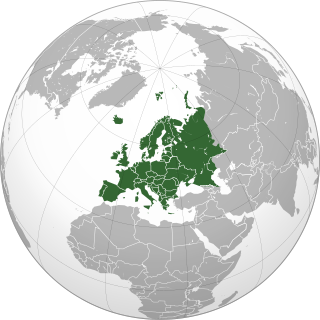
Europe is a continent located entirely in the Northern Hemisphere and mostly in the Eastern Hemisphere. It is bordered by the Arctic Ocean to the north, the Atlantic Ocean to the west, the Mediterranean Sea to the south, and Asia to the east. Europe shares the landmass of Eurasia with Asia, and of Afro-Eurasia with both Asia and Africa. Europe is commonly considered to be separated from Asia by the watershed of the Ural Mountains, the Ural River, the Caspian Sea, the Greater Caucasus, the Black Sea, and the waterway of the Bosporus Strait.

The European Union (EU) is a supranational political and economic union of 27 member states that are located primarily in Europe. The Union has a total area of 4,233,255 km2 (1,634,469 sq mi) and an estimated total population of over 449 million. The EU has often been described as a sui generis political entity combining the characteristics of both a federation and a confederation.

The euro is the official currency of 20 of the 27 member states of the European Union. This group of states is officially known as the euro area or, more commonly, the eurozone. The euro is divided into 100 euro cents.

The European Parliament (EP) is one of the two legislative bodies of the European Union and one of its seven institutions. Together with the Council of the European Union, it adopts European legislation, following a proposal by the European Commission. The Parliament is composed of 720 members (MEPs), after the June 2024 European elections, from a previous 705 MEPs. It represents the second-largest democratic electorate in the world, with an electorate of around 375 million eligible voters in 2024.

In the history of Europe, the Middle Ages or medieval period lasted from approximately 500 to 1500 AD. It is the second of the three traditional divisions of Western history: antiquity, medieval, and modern. Major developments include the economic predominance of agriculture, exploitation of the peasantry, slow inter-regional communication, the importance of personal relationships in power structures, and the weakness of state administration. The period is sometimes subdivided into the Early, High, and Late Middle Ages, and the early medieval period is alternatively referred to as the Dark Ages.

Real Madrid Club de Fútbol, commonly referred to as Real Madrid, is a Spanish professional football club based in Madrid. The club competes in La Liga, the top tier of Spanish football.
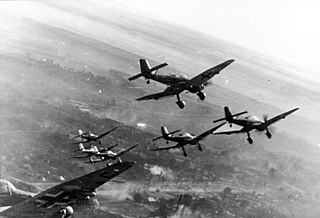
World War II or the Second World War was a global conflict between two alliances: the Allies and the Axis powers. Nearly all of the world's countries—including all the great powers—participated, with many having invested all available economic, industrial, and scientific capabilities in pursuit of total war, blurring the distinction between military and civilian resources. Tanks and aircraft played major roles, with the latter enabling the strategic bombing of population centres and delivery of the only two nuclear weapons ever used in war. World War II was the deadliest conflict in history, resulting in 70 to 85 million fatalities, more than half of which were civilians. Millions died in genocides, including the Holocaust of European Jews, and by massacres, starvation, and disease. Following the Allied powers' victory, Germany, Austria, Japan, and Korea were occupied, and war crimes tribunals were conducted against German and Japanese leaders.
Western Europe is the western region of Europe. The region's extent varies depending on context. The concept of "the West" appeared in Europe in juxtaposition to "the East" and originally applied to the ancient Mediterranean world, the Roman Empire, and medieval "Christendom". Beginning with the Renaissance and the Age of Discovery, roughly from the 15th century, the concept of Europe as "the West" slowly became distinguished from and eventually replaced the dominant use of "Christendom" as the preferred endonym within the region. By the Age of Enlightenment and the Industrial Revolution, the concepts of "Eastern Europe" and "Western Europe" were more regularly used. The distinctiveness of Western Europe became most apparent during the Cold War, when Europe was divided for 40 years by the Iron Curtain into the Western Bloc and Eastern Bloc, each characterised by distinct political and economical systems.

The UEFA Champions League is an annual club association football competition organised by the Union of European Football Associations (UEFA) and contested by top-division European clubs, deciding the competition winners through a round robin group stage to qualify for a double-legged knockout format, and a single leg final. It is the most-watched club competition in the world and the third most-watched football competition overall, behind only the UEFA European Championship and the FIFA World Cup. It is one of the most prestigious football tournaments in the world and the most prestigious club competition in European football, played by the national league champions of their national associations.

Ashkenazi Jews, also known as Ashkenazic Jews or Ashkenazim, constitute a Jewish diaspora population that emerged in the Holy Roman Empire around the end of the first millennium CE. They traditionally spoke Yiddish and largely migrated towards northern and eastern Europe during the late Middle Ages due to persecution. Hebrew was primarily used as a literary and sacred language until its 20th-century revival as a common language in Israel.

The UEFA European Football Championship, less formally the European Championship and informally the Euro or Euros, is the primary association football tournament organised by the Union of European Football Associations (UEFA). The competition is contested by UEFA members' senior men's national teams, determining the continental champion of Europe. It is the second-most watched football tournament in the world after the FIFA World Cup; the Euro 2016 final was watched by a global audience of around 600 million. The competition has been held every four years since 1960, except for 2020, when it was postponed until 2021 due to the COVID-19 pandemic in Europe, but kept the name Euro 2020. Scheduled to be in the even-numbered year between FIFA World Cup tournaments, it was originally called the European Nations' Cup before changing to its current name in 1968. Since 1996, the individual events have been branded as "UEFA Euro [year]".
Proto-Indo-European (PIE) is the reconstructed common ancestor of the Indo-European language family. No direct record of Proto-Indo-European exists; its proposed features have been derived by linguistic reconstruction from documented Indo-European languages.

The 2008 UEFA European Football Championship, commonly referred to as UEFA Euro 2008 or simply Euro 2008, was the 13th UEFA European Championship, a quadrennial football tournament contested by the member nations of UEFA. It took place in Austria and Switzerland from 7 to 29 June 2008.
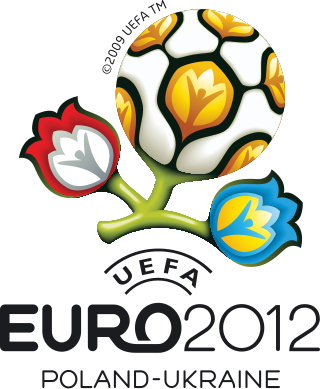
The 2012 UEFA European Football Championship, commonly referred to as UEFA Euro 2012 or simply Euro 2012, was the 14th European Championship for men's national football teams organised by UEFA. The final tournament, held between 8 June and 1 July 2012, was co-hosted by Poland and Ukraine, and was won by Spain, who beat Italy in the final at the Olympic Stadium, Kyiv, Ukraine.
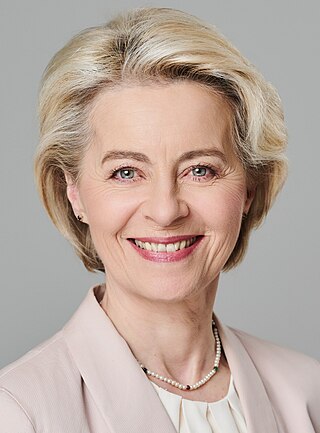
Ursula Gertrud von der Leyen is a German politician, serving as the 13th president of the European Commission since 2019. She served in the German federal government between 2005 and 2019, holding positions in Angela Merkel's cabinet, most recently as federal minister of defence. She is a member of the centre-right Christian Democratic Union (CDU) and its affiliated europarty, the European People's Party (EPP). On 7 March 2024, the EPP elected her as its Spitzenkandidat to lead the campaign for the 2024 European parliament elections. She was re-elected to head the Commission in July 2024.
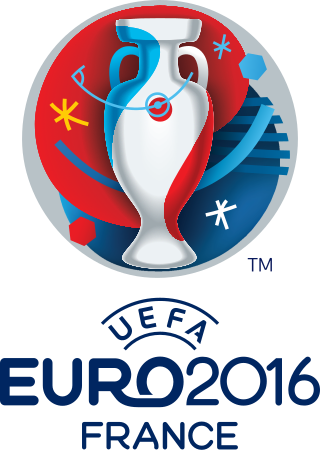
The 2016 UEFA European Football Championship, commonly referred to as UEFA Euro 2016 or simply Euro 2016, was the 15th UEFA European Championship, the quadrennial international men's football championship of Europe organised by UEFA. It was held in France from 10 June to 10 July 2016. Spain were the two-time defending champions, having won the 2008 and 2012 tournaments, but were eliminated in the round of 16 by Italy. Portugal won the tournament for the first time, following a 1–0 victory after extra time over the host team, France, in the final played at the Stade de France.
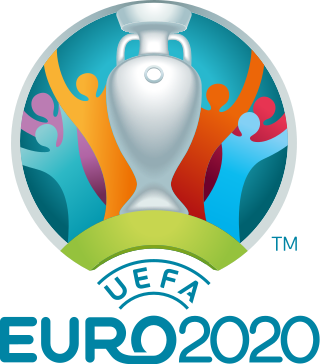
The 2020 UEFA European Football Championship, commonly referred to as UEFA Euro 2020 or simply Euro 2020, was the 16th UEFA European Championship, the quadrennial international men's football championship of Europe organised by the Union of European Football Associations (UEFA). To celebrate the 60th anniversary of the European Championship competition, UEFA president Michel Platini declared that the tournament would be hosted in several nations as a "romantic" one-off event, with 11 cities in 11 UEFA countries each providing venues for the tournament, making it the second senior international tournament in history after the 2007 AFC Asian Cup to have more than two nations co-hosting it.

The 2024 UEFA European Football Championship, commonly referred to as UEFA Euro 2024 or simply Euro 2024, was the 17th UEFA European Championship, the quadrennial international football championship organised by UEFA for the European men's national teams of their member associations. Germany hosted the tournament, which took place from 14 June to 14 July 2024. The tournament involved 24 teams, with Georgia making their European Championship debut.

The UEFA Euro 2020 final was an association football match between Italy and England that took place at Wembley Stadium in London, England, on 11 July 2021 to determine the winner of UEFA Euro 2020. It was the 16th final of the UEFA European Championship, a quadrennial tournament contested by the senior men's national teams of the member associations of UEFA to decide the champions of Europe. Originally scheduled for 12 July 2020, the match had been postponed along with the rest of the tournament due to the COVID-19 pandemic in Europe.

The 2024 European Parliament election was held in the European Union (EU) between 6 and 9 June 2024. It was the tenth parliamentary election since the first direct elections in 1979, and the first European Parliament election after Brexit. A total of 720 Members of the European Parliament (MEPs) were elected to represent more than 450 million people from 27 member states. This election also coincided with a number of other elections in some European Union member states.